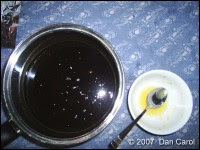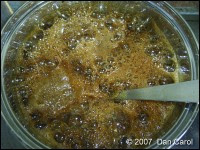 I am living on an island where sugar is cheap and sugar refining is big business, so it's not unusual to want to play with sugar in brewing. I'm not a big fan of the cider flavours of plain old cane sugar but I have enjoyed small additions of caramelized invert sugar.
I am living on an island where sugar is cheap and sugar refining is big business, so it's not unusual to want to play with sugar in brewing. I'm not a big fan of the cider flavours of plain old cane sugar but I have enjoyed small additions of caramelized invert sugar.Inverting the sugar means converting cane sugar's sucrose into fructose and glucose by using an acid like citric acid. The sugar is boiled for 30 minutes on low heat in a little bit of water. Caramelizing is the oxidization of sugars and creates more interesting and complex flavours. In the Belgian style beers, candi sugar is used to increase alcohol content, impart a variety of colours and flavours and create a lovely dense mousse-like head.
In darker beers I like to use a small amount, say 500g of dark brown sugar (muscovado) or light brown sugar (demarama). I will usually mix these half and half with white sugar and caramelize to create a nice complex sweetness. My recipe for my half and half sugars is like this:
250g white sugar
250g demarama sugar
2 tbs calamansi juice (or 1 tsp citric acid)
water to cover
 Put sugar and calamansi (or lemon or lime) juice in a pot. Add water just to cover. Stir and heat on low. Keep boiling it on low. Add a tablespoon of water occasionally as the syrup gets too thick. As the sucrose reacts with the water and acid (citric acid) it becomes fructose and glucose. As the heat is applied the sugars oxidize and burn slightly, called caramelization. Caramelization produces interesting flavors in beer as some of these flavours appear in the finished product. After the sugar is the desired colour or flavour turn up the heat a little to remove any excess water. Pour the thick syrup onto some baking paper and allow it to cool and solidify. Store in plastic bags in the fridge and have it ready for brew day.
Put sugar and calamansi (or lemon or lime) juice in a pot. Add water just to cover. Stir and heat on low. Keep boiling it on low. Add a tablespoon of water occasionally as the syrup gets too thick. As the sucrose reacts with the water and acid (citric acid) it becomes fructose and glucose. As the heat is applied the sugars oxidize and burn slightly, called caramelization. Caramelization produces interesting flavors in beer as some of these flavours appear in the finished product. After the sugar is the desired colour or flavour turn up the heat a little to remove any excess water. Pour the thick syrup onto some baking paper and allow it to cool and solidify. Store in plastic bags in the fridge and have it ready for brew day.If you are using basic white sugar it will take about 20 to 30 minutes of low heat to produce an amber coloured candi sugar. In 45 minutes the syrup will begin to appear orange. It can take over 1 hour to produce dark red candi sugar, so be patient and watch the pot all the time. If you have a thermometer, try to maintain 120ºC (ºF) . An oven style, dial face, meat probe works good. If you have a candy thermometer, even better.
Increasing gravity
As a rule, 1 pound of sugar in 1 gallon of water is 1.046 (46 gravity points). In metric this is about 120 grams per litre. Adding a kilogram of inverted sugar to a standard batch of beer adds about 15 points. Depending on the Terminal Gravity (TG), this increase in gravity can increase alcohol content by over 2%. The Belgian ales, dubbels and triples are high-strength beers often above 7% and some exceeding 10% alc./vol.
Sweet eh?
Feel free to experiment with candi sugar or a homemade facsimile in your brewing. Start on the light side though, too much sugar can give your beer an alcohol boost, but it can also make your beer taste like wine.
Cheers,

2 comments:
Hi great article, may I ask where you purchase citric acid locally?
Hi, I used calamansi for the acidic component. I have seen citric acid sold in SM Supermarket in Iloilo City. I don't know of other stores in other regions. Maybe someone else can comment. There is also lemon juice and calamansi juice concentrate that works.
Cheers
Dan
Post a Comment